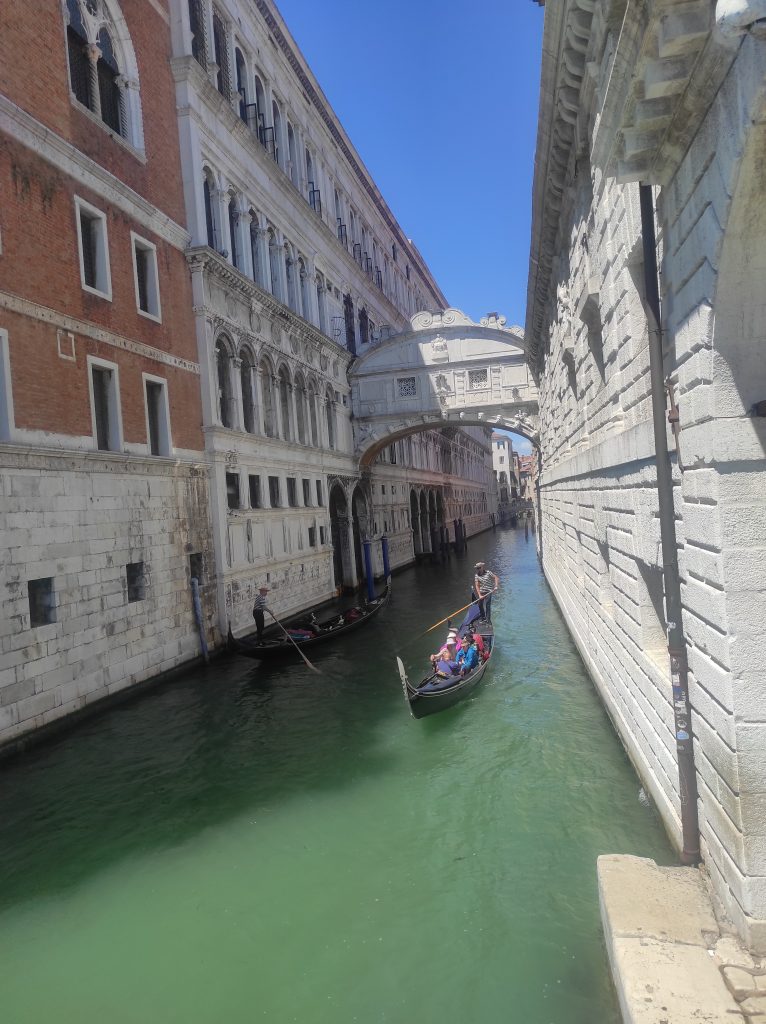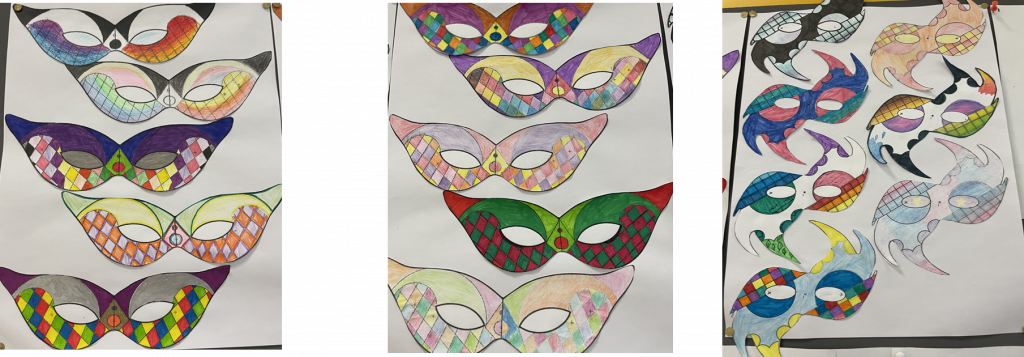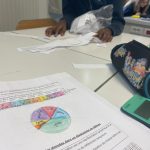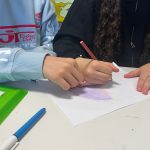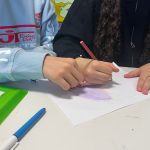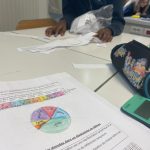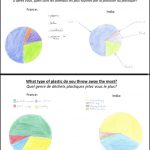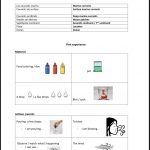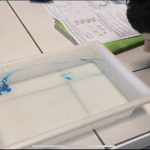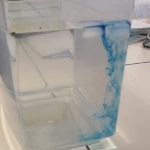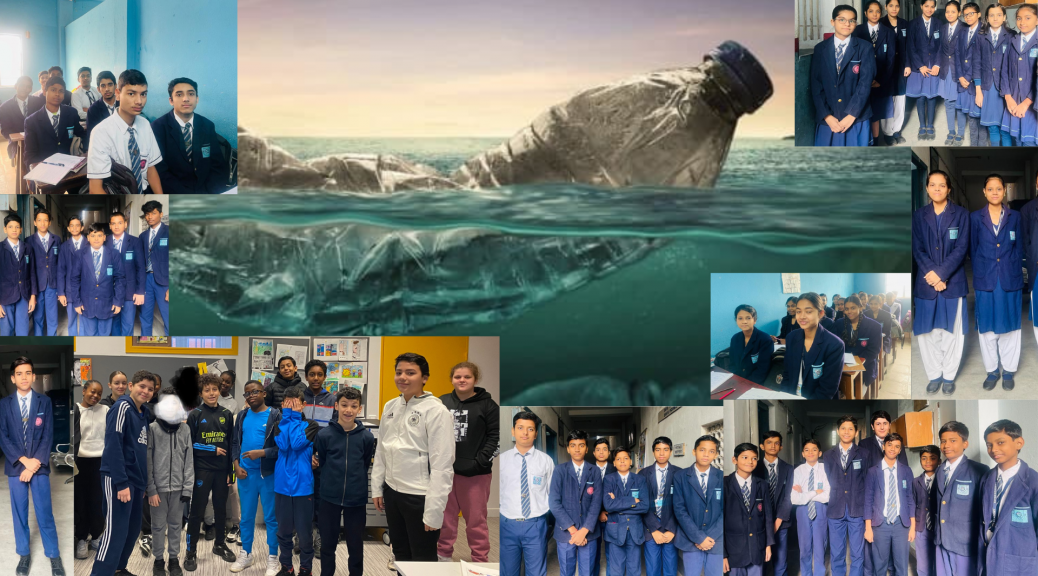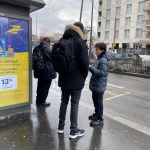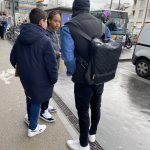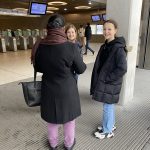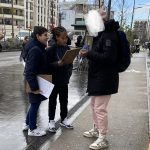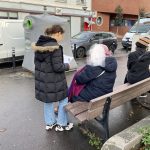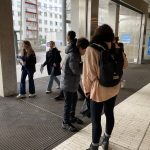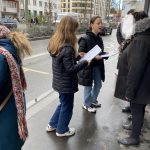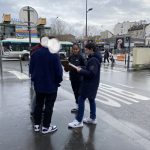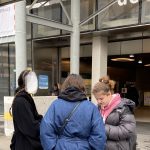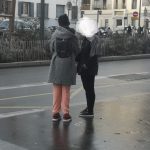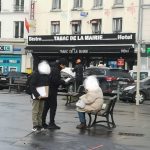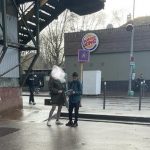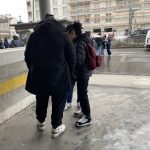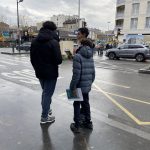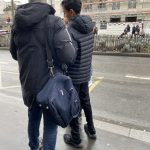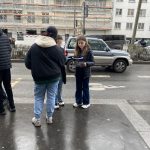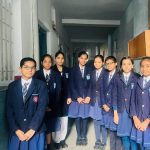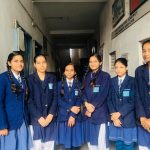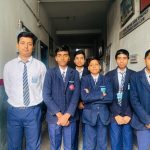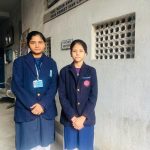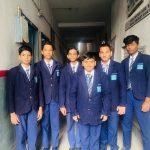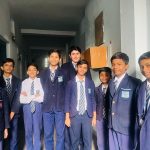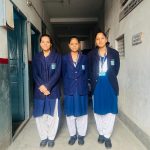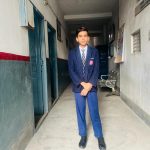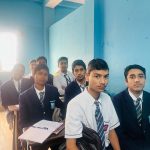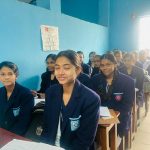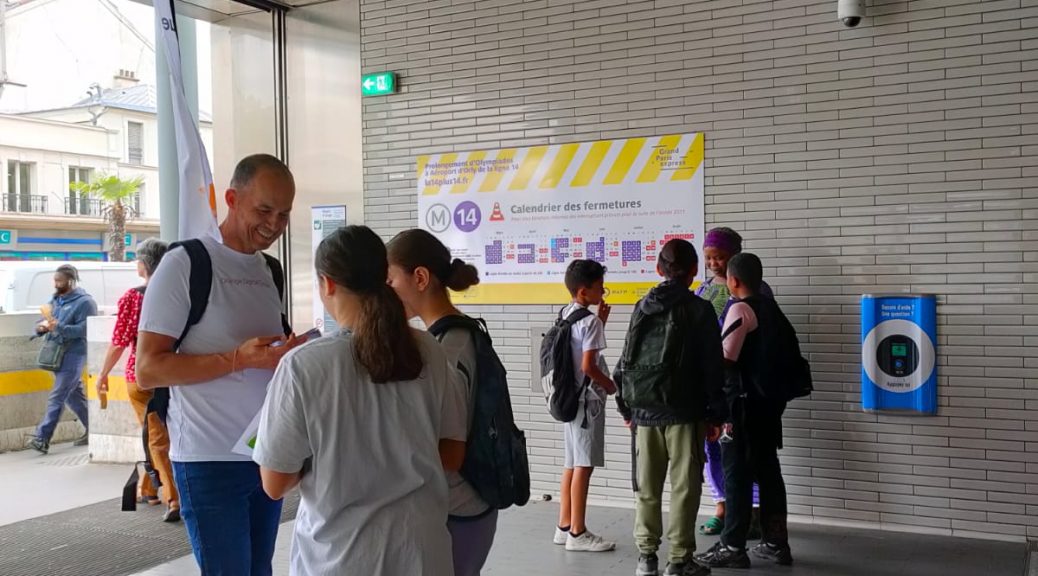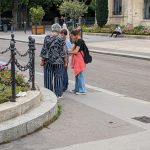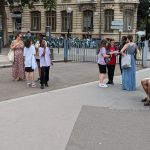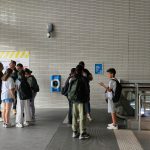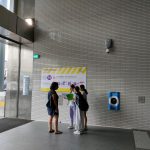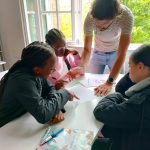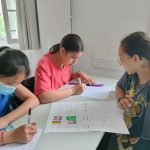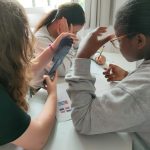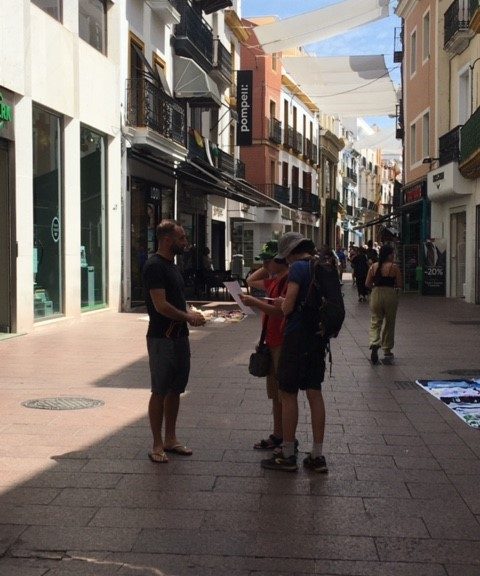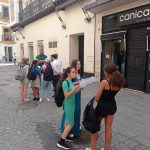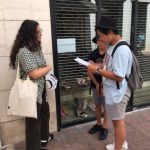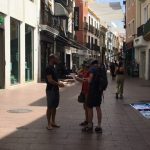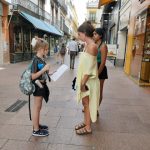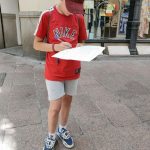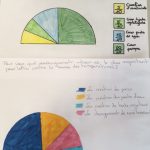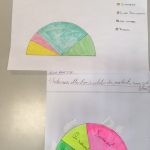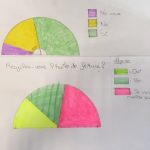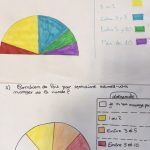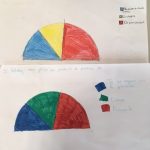Cette année, c’est la classe de 5e8 qui participe au projet ECOCLUB en partenariat avec l’école d’ingénieurs à Gif sur Yvette, CentraleSupélec.
L’objectif du projet est double : travailler les sciences- ici SVT et mathématiques- en anglais et sensibiliser les élèves aux problématiques environnementales actuelles. A la fin de l’année ils devront faire une présentation tout en anglais devant un large public et un jury au cœur de CentraleSupélec.
Avec leur professeur d’SVT, Mme Mayer, ils ont tout d’abord réalisé une recherche globale sur l’usage du plastique, la décomposition de celui-ci, son effet sur l’environnement. Ensuite à partir de cette recherche ils ont élaboré un questionnaire afin de réaliser un sondage auprès des Audoniens. Ils ont ensuite en cours d’anglais traduit ce questionnaire en anglais pour en faire une version en ligne, à laquelle des élèves indiens du collège de Patna Academy répondraient.
Le mardi 12 décembre ils sont allés interroger les passants volontaires aux abords de l’établissement avec Mme Mayer, Mme Bourgeois et Mme Haque, et ont recueillis pas moins de 200 questionnaires complets ! Dans un premier temps intimidés, ils ont ensuite pris confiance et ne voulaient plus arrêter.
Le mercredi 13 et jeudi 14 décembre, le questionnaire en anglais a été mis en ligne et il a été demandé aux élèves de l’école de Patna Academy, dans la ville de Patna, en Inde, de répondre au questionnaire pendant leurs cours de sciences ou à la maison. Nous avons reçu 81 réponses. Nos élèves ont également pu voir une photo de tous les élèves indiens ayant répondu à leur enquête.
En parallèle, avec leur professeur d’anglais, ils sont allés enterrer dans le jardin 6 objets : bouchon de bouteille en plastique, capsule métallique, une feuille d’arbre, un trognon de pomme, du papier toilette, du carton. Chaque semaine lors du club jardin, Mme Mayer fait déterrer les objets aux élèves de 5e8 présents, en en classe d’anglais nous statuons sur l’évolution de l’objet… en anglais évidemment dans une fiche prévue pour.
Ils prépareront cette semaine avec Mme Mayer et Mme Bourgeois leur professeure de Mathématiques des statistiques à partir des sondages réalisés sur l’usage, la perception que l’on a du plastique.
Ce n’est que le début !
Un grand merci aux Audoniens et aux élèves de Patna Academy!
_______________
In English
ECOCLUB : A project about plastic with the 5e8
This year, it is the class of 5e8 which is part of the Ecoclub project with CentraleSupélec in Gif sur Yvette, which is an engineer school.
This aim of it is studying sciences in English and raising students’ awareness about environmental issues. At the end of the school year, they will have to do an oral presentation in front of a large audience and a jury at CentraleSupélec itself.
With their Biology teacher, Mrs Mayer, they started by doing an individual research about plastic use, its decomposition and its impact on the environment. Then, using their research results, they prepared a survey so to be able to ask Saint Ouen residents questions about their use of plastic, what they thought about its impact on the environment. Finally, they translated it in English to make an online survey so students from Patna Academy school (India) could answer their questions.
On the 12th of December, they went out in Saint Ouen to do the survey, with Mrs Mayer, Mrs Bourgeois and Mrs Haque. They completed no less than 200 surveys! At first, they felt a bit shy and ashamed, but finally they gained confidence and would have wanted the experience never to stop!
On the 13th and 14th of December, the online survey was sent to Patna academy teachers so students in that school could complete it. Patna Academy is a school located in Patna, in India. Students answered during Science class or at home. We received 81 completed surveys. Our students were also able to see the faces of the Patna Academy students who answered – they send us their pictures.
Meanwhile all of this was happening, the students went to the school garden to bury 6 different objects: a leaf, a metal cap, a plastic bottle cap, toilet paper, an apple core, a piece of cardboard. Each week, during the Garden Club, Mrs Mayer and the 5e8 participating to it will dig the objects out, take pictures and in English class, we comment on their state : have they changed? Are they decomposing ? Are they the same?
This very week with Mrs Mayer and Mrs Bourgeois, their maths teacher they will use the surveys to do statistics on plastic use, perception about it .
It is only the beginning !
We are very grateful to people living in Saint Ouen and students of Patna Academy who participated to our projects!
________________
Retour des élèves / feedback
‘Nous sommes allés devant la mairie au début on était timide et on ne voulait pas interroger les gens mais à la fin ça nous a plu (…) Ça m’a beaucoup plu d’être sorti et d’avoir parlé aux gens.’ Anaïs
‘We went in front of the mayor’s hall and at the beginning we were shy and we didn’t dare asking the questions but in the end, we enjoyed it (…) I really liked going out and talking to people.’
‘j’ai bien aimé et on a rempli environ 200 feuilles et il y a eu des personnes gentilles, patientes.’ (Seif)
‘I liked it and we ask around 200 people, and some were nice and patient.’
‘C’était super bien. La sortie était agréable. J’ai bien aimé parce qu’on a parlé à des gens qu’on ne connaissait pas, ils n’étaient pas forcément français, il y avait des allemands, des anglais. Ses deux heures sont passées vraiment trop vite. C’est vraiment à refaire’. Wail
‘It was great. The field trip was pleasant. I liked it because we talked to people we didn’t know, sometimes they were not French but German or English. The two hours went by too quickly. We must do it again.’
‘J’ai aimé la sortie car dans la vie de tous les jours je suis sociable donc c’était simple’ Lisandro
‘I liked it because in everyday’s life I am sociable so it was easy for me’.
‘J’ai trouvé que la sortie était cool et amusante’ Adam
‘I thought it was cool and entertaining’
‘On a fait un sondage sur le plastique et on a interrogé des gens dans la rue pour leur demander s’ils recyclent ou s’ils savent qui sont les animaux les plus touchés par la pollution au plastique. Farell
‘We did a survey about plastic and we asked people in the street to know if they recycled plastic, or if they knew which animals were the most impacted by plastic pollution.’
‘Ils ont presque tous dit que les poissons étaient les plus touchés. Moi j’ai réussi à communiquer avec un allemand. Olamide a parlé en anglais. Je pense que c’est à refaire, j’ai bien aimé.’ Youssef
‘They almost all said fish were the most impact. I succeeded to communicate with a German person. Olamide spoke in English. I think we should do it again. I liked it.’
‘J’ai trouvé la sortie originale et j’ai beaucoup aimé aller voir les gens car ils étaient pour la plupart gentils. Et j’ai trouvé la sortie éducative et intéressante. J’ai aimé interroger des personnes âgées car ils étaient souriants et gentils.’ (Norhène)
‘I thought it was one of a kind field trip and I really liked talking with people because the majority was nice. And I thought the fieldtrip was educative and interesting. I liked asking the questions to older people because they were nice and smiled.
‘La sortie était trop bien.’ Fetta
‘It was great’
‘Nous avions imprimés des questionnaires à partir de notre réflexion sur des questions sur le plastique. Lorsque nous avons commencé nous avons pensé que personne ne répondrait à nos questions mais c’était le contraire.
Tout s’est bien passé, nous avons connus des personnes et leur quotidien avec le plastique, les réponses sont différentes (…) il y a quand même des personnes joyeuses, gentilles et positives. Mais après tout nous étions joyeux avec eux. La sortie était incroyable.’ (Diaryatou)
‘We had printed the surveys based on our research about plastic. When we started we thought nobody would answer our questions mais it was the opposite.
All went well, we got to know people and their use of plastic, there are different answers (…) there are joyful, nice and positive people. And afterall we were joyful with them. The field trip was amazing.’
‘La sortie s’était bien passé. Il y avait des chinois, des allemands, puis des anglais.’ (Louay)
The field trip went well. There were Chinese people, Germans, English.’
‘La sortie s’est très bien passée parce que j’aimais beaucoup parler avec les gens surtout les gens qui respirent la joie de vivre et qui sont drôles, agréables et surtout polis. Et on remarque qu’il y a plein de gens qui ignorent beaucoup de choses sur la pollution.’ (Triana)
‘It went very well because I really enjoyed talking with people, especially those who were joyful, funny, nice and polite. And we noticed there are many people who don’t really know much about pollution.’
‘C’était bien. Il y avait des gens bienveillants (..) Olamide a dû faire la traduction pour des gens qui ne parlaient pas français’. (Fatima)
‘It was a good experience. They were really nice people (…) Olamide had to translate for people who didn’t speak French.’
‘Beaucoup de gens étaient très gentils. J’ai parlé à une personne en anglais, j’ai pris beaucoup de temps à finir le questionnaire mais il était très gentil car il a pris le temps de m’écouter.’ (Belaïd)
‘A lot of people were really nice. I talk to someone in English. It took me a long time to finish the survey but he was really nice because he took the time to listen to me.’
‘La sortie était bien, beaucoup de personnes ont répondu. Quand on disait que c’était pour l’école, ils répondaient. Certains ne parlaient même pas français, certains parlaient allemand, il y avait un anglais et Olamide a traduit en anglais. J’ai bien aimé la sortie’ (Bintou)
‘It was a good experience, many people answered our questions. When we said it was for school, they answered. Some didn’t even speak French, some spoke German, and there was an English man and Olamide translated the survey. I liked it.’
‘J’ai aimé la sortie. Et j’ai interrogé une personne en anglais’ (Olamide)
‘I liked it. And I talked with someone in English.4
‘J’ai trouvé ça très intéressant.’ (Camélia)
I thought it was really interesting.
‘Tellement que cela s’est bien passé on avait plus de feuilles, alors on est retourné au collège pour imprimer des questionnaires et sortir à nouveau. La sortie était bien.’ Rayan
‘It went so well we didn’t have enough surveys to fill, so we went back to the school to print some new one and keep asking people in the street. It was a good experience’.
‘J’ai bien aimé la sortie’ (Océane)
‘I liked it very much’


